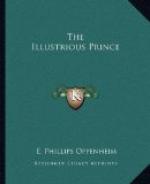“The matter would arrange itself in precisely the same way,” the Prince answered. “You would not leave these rooms for two months.”
The doctor leaned back in his chair and laughed shortly.
“This is rather hard luck on Inspector Jacks,” he said. “He paid me ten guineas the other day to lunch with him.”
“Mr. Inspector Jacks,” the Prince remarked, “is scarcely in a position to bid you an adequate sum for your services.”
“It appears to me,” the doctor continued, “that I am kidnapped.”
“An admirable word,” the Prince declared. “At what time do you usually lunch?”
The doctor smiled.
“I am not used to motoring,” he said, “or interviews of this exciting character. I lunch, as a rule, when I can get anything to eat. The present seems to me to be a most suitable hour.”
The Prince nodded, and rose to his feet.
“I will send my servant,” he said, “to take your orders. My cook is very highly esteemed here, and I can assure you that you will not be starved. Please also make out a list of the newspapers, magazines, and books with which you would like to be supplied. I fear that, for obvious reasons, my people would hardly be able to anticipate your wants.”
“And about that examination?” the doctor remarked.
“I shall do myself the pleasure of seeing you every day,” the Prince answered. “There will be time enough for that.”
With an amiable word of farewell the Prince departed. The doctor threw himself into an easy chair. His single exclamation was laconic but forcible.
CHAPTER XXVI. SOME FAREWELLS
Never did Prince Maiyo show fewer signs of his Japanese origin than when in the company of other men of his own race. Side by side with His Excellency the Baron Hesho, the contrasts in feature and expression were so marked as to make it hard, indeed, to believe that these two men could belong to the same nation. The Baron Hesho had high cheekbones, a yellow skin, close-cropped black hair, and wore gold-rimmed spectacles through which he beamed upon the whole world. The Prince, as he lounged in his wicker chair and watched the blue smoke of his cigarette curl upwards, looked more like an Italian—perhaps a Spaniard. The shape of his head was perfectly Western, perfectly and typically Romanesque. The carriage of his body must have been inherited from his mother, of whom it was said that no more graceful woman ever walked. Yet between these two men, so different in all externals, there was the strongest sympathy, although they met but seldom.
“So we are to lose you soon, Prince,” the Baron was saying.
“Very soon indeed,” Prince Maiyo answered. “Next week I go down to Devenham. I understand that the Prime Minister and Sir Edward Bransome will be there. If so, that, I think, will be practically my leave-taking. There is no object in my staying any longer over here.”




